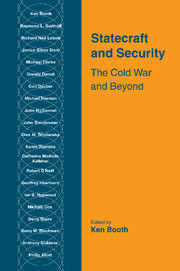Book contents
- Frontmatter
- Contents
- List of contributors
- Preface
- Introduction
- Part one Cold War: lessons and legacies
- Part two Post-Cold War: powers and policies
- 5 Can the United States lead the world?
- 6 Can Russia escape its past?
- 7 Imperialism, dependency and autocolonialism in the Eurasian space
- 8 Western Europe: challenges of the post-Cold War era
- 9 Europe and the wider world: the security challenge
- 10 A new Japan? A new history?
- 11 New China: new Cold War?
- 12 Africa: crisis and challenge
- 13 Of medium powers and middling roles
- Part three Beyond: resistances and reinventions
- Conclusion: security within global transformation?
- Index
13 - Of medium powers and middling roles
Published online by Cambridge University Press: 06 October 2009
- Frontmatter
- Contents
- List of contributors
- Preface
- Introduction
- Part one Cold War: lessons and legacies
- Part two Post-Cold War: powers and policies
- 5 Can the United States lead the world?
- 6 Can Russia escape its past?
- 7 Imperialism, dependency and autocolonialism in the Eurasian space
- 8 Western Europe: challenges of the post-Cold War era
- 9 Europe and the wider world: the security challenge
- 10 A new Japan? A new history?
- 11 New China: new Cold War?
- 12 Africa: crisis and challenge
- 13 Of medium powers and middling roles
- Part three Beyond: resistances and reinventions
- Conclusion: security within global transformation?
- Index
Summary
Social scientists who apply their craft to the study of international affairs sometimes display disconcerting habits. One of them comes from their love of conceptual order and their impatience with the untidiness of the real world. Commentators on the roles played by ‘middle powers’ in world affairs too often exhibit precisely this unrestrained search for relief from eclecticism. Hence they assume, or they try artfully to demonstrate, that patterns exist where in fact they do not, and that causes are simple when they are actually complex.
Generalising about the behaviour of a motley collection of highly differentiated states – operating, as they do, in kaleidoscopic environments with diverse challenges in view and disparate objectives in mind – is risky business. It calls for great care in ensuring that the conclusions reached, and the lessons drawn, do not depend on excessively contorted evidence for such practical import as they are held to possess. It is my purpose, nonetheless, to take the generalising as far as I can, and the task implies a normative as well as descriptive inquiry. The question is not merely what middle powers can do (or have done) but what they should do, given the world in which we now find ourselves.
What is a ‘middle power’ and does it really help to know?
The trouble starts with the very idea of a middle power.
- Type
- Chapter
- Information
- Statecraft and SecurityThe Cold War and Beyond, pp. 270 - 286Publisher: Cambridge University PressPrint publication year: 1998
- 19
- Cited by



